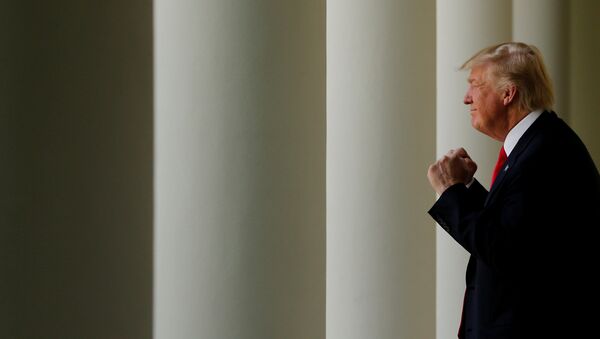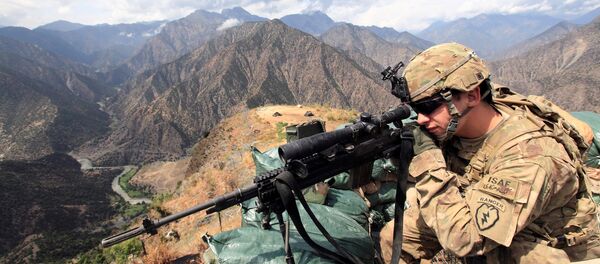Trump refused to set any deadlines for US reductions in force levels or military withdrawals from Afghanistan. And he emphasized that he would give his military commanders the freedom to wage war more rapidly and ruthlessly in order to destroy alleged terrorist targets.
The US president in his speech also made no mention of requiring safeguards to minimize civilian casualties in inflicted as a result of this policy.
TRUMP’S AFGHANISTAN SPEECH MASKED HIDDEN US AGENDA REDARDING RUSSIA
Trump used his speech on a new strategy in Afghanistan to justify the maintaining of major US ground and air forces based in that country for the foreseeable future.
However, basing such forces in a geographically crucial crossroads of Asia would also position them to be used for aggressive operations against Russia or China in the foreseeable future.
Moreover, major permanent US military bases in Afghanistan could serve to support destabilizing terrorist or secessionist movement against Moscow or Beijing. They could also be used with Indian support to intimidate Pakistan.
Trump did not mention Russia in his August 21 speech, but the unstated larger strategic purpose of his determination to maintain US military presence in Afghanistan was to surround and oppose Russia, California State University Professor Emeritus of Political Science Beau Grosscup told Sputnik.
"The larger strategic goal is to maintain the encirclement of Russia to prevent the rise of a competing power and access to the valuable mineral resources that President Trump acknowledged recently that have been reported for over a decade," he said.
The United States is continuing to aggressively seek to expand NATO around Russia’s perimeter and through the former Soviet republics of the Near Abroad region.
US and NATO ambitions to encircle Russia were made explicit in the continuous amassing of military equipment and troops as well as in conducting military exercises on Russia’s western border. Washington has supplied weapons to countries bordering Russia, particularly Ukraine and Georgia, revealing its strategic intentions toward Moscow.
Moreover, the United States is also seeking to expand its military as well as economic influence and power in oil-rich Kazakhstan and Azerbaijan in order to dominate the oil and natural gas riches of the Caspian Basin, supplanting both Russia and China in the region.
Trump’s Afghanistan strategy speech marked a reversal from the positions he repeatedly took during his 2016 election campaign when he emphasized the need for the United States to withdraw its forces from the Afghanistan and Iraq conflicts.
Grosscup recalled that Trump waged his successful election campaign promising to pull the United States out of endless, futile wars around the world, re-establish good relations with Russia and give priority to rebuilding the domestic economy.
Now, Trump had adopted their hardline views on intensified US involvement in conflicts around the world in order to maintain Washington’s claimed global hegemony and to deny the reality of a multi-polar world in which Russia and China play a major role.
These figures had convinced Trump to remain in Afghanistan and also alarmed the president by inflating the alleged wider threat that, they claimed, was posed by the resurgent Taliban, Grosscup explained.
"In essence, this is the US National Security State (NSS) plan that his national security team easily convinced President Trump of by arguing that the Taliban threatened ‘Western values’ while saying nothing about the two larger long term strategic goals," he said.
Despite Trump’s claim in his speech that he was abandoning the nation-building goals of Bush and Obama, his speech was really a plea to continue their old, discredited and consistently failed policies in Afghanistan, Grosscup pointed out.
"President Trump’s Afghanistan plan is more of the same in the sense that the goal of the National Security State is to keep a US presence in Afghanistan to bolster the Afghan government while trying to prevent a complete Taliban victory," he added.
TRUMP ACCEPTED ONGOING US MILITARY PRESENCE IN THE HEART OF ASIA
Co-coordinator for Voices for Creative Nonviolence Brian Terrell, an expert on Afghanistan, agreed that the Afghanistan strategy speech revealed Trump had cut a deal with the military war hawks to support their insistence on continuing to wage war aggressively in Afghanistan and maintain major US forces in the region.
"He has… reconciled with his generals… agreeing to give them at least some of the troop surge they want," he said.
Terrell also suggested that Trump wanted to continue the Afghan war to try and rally the American people behind him in a show of patriotism.
"I think that Trump is using the war as a call for unity… [To Trump] the 16-year-old war on the Afghan people is a more real, more serious and dangerous manifestation of racism than a Klan march," he said.
Trump was making common cause with his generals to try and sell a popular version of militarism to the American people Terrell added.



